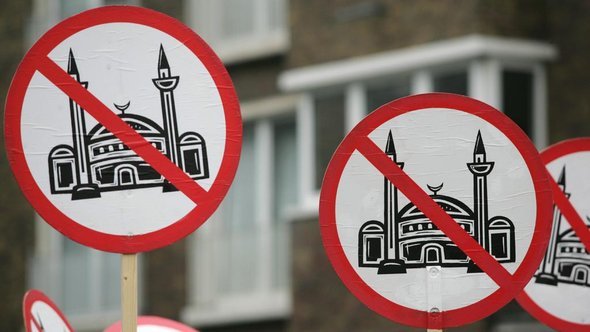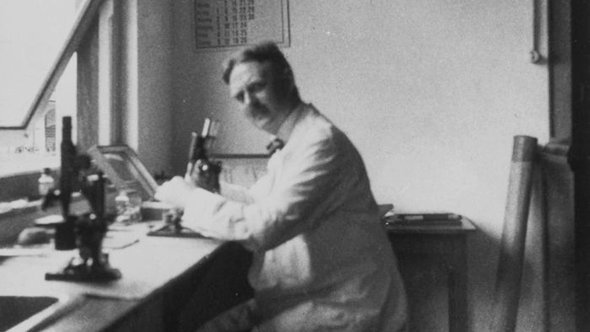Ideological Vacuum
Neo-Nazis, one logically assumes, bear this label because of their affinity to the Nazis. And opponents of Islam, up to and including Thilo Sarrazin, the German populist politician and writer, are often accused of employing stereotypes bearing a strong resemblance to the ideology of the Third Reich. It is also well known that Nazi Germany, like Imperial Germany before it, searched for allies in the Islamic world. Yet, what has long been forgotten is the actual view of Islam held by the Nazis all those years ago.
As a means of elucidation, let us cast a glance at a widely disseminated piece of propaganda from the year 1941, a "satchel document" of the Wehrmacht Supreme Command, Domestic Division entitled "Islam". The khaki green cover bears the words "Not for acquisition, instead disseminate!"
"Europeans in Mohammedan lands"
I acquired the 64-page booklet for one euro fifty at a second-hand bookstore in Kiel in northern Germany. The back cover reads "Guidelines for the conduct of Europeans in Mohammedan lands." Its author could have been Rowan Williams, the former archbishop of Canterbury.
It begins as follows:
- Remain constantly aware that Islam is an advanced religion that is in no way inferior to Christianity in its conception of God.
- Any encounter with Muslims should always be conducted in the same spirit of respect and forbearance as that shown between Christians of different denominations.
The first and abundantly vexing realization is that these conduct guidelines could be passed on to any tourist or soldier in Afghanistan even today. Yet, one thing is clear. These are rules of conduct with Muslims in occupied countries.
With this in mind, caution and respect could merely be signs of military prudence (which was certainly not the case during the occupation of Eastern Europe).

Much more interesting for us today is how Islam, as such, was described at the time. Right in the preface, we can read something that remains difficult for many to recognize to this day, namely, that the world Islam is essentially pluralistic. "Despite all the commonalities in the foundations of the teachings, there are essential differences in the religion's external manifestations within the various regions dominated by Islam."
The reader is overcome by a growing sense of bewilderment. One preconception after another concerning Islam is dismantled in the following pages. Almost everything printed in this text could nowadays serve as arguments against the positions of those in the anti-Islam movement, regardless of whether from a Christian or right-wing nationalist persuasion.
"The assertion that we were taught in our history classes that 'Islam' was spread through 'fire and sword' by the Arabs and Turks is totally erroneous. [...] This historical fallacy (could) perhaps be unimportant with respect to our conduct in Muslim lands provided that we do not regard every Muslim as our natural enemy."
This is very nicely put. It is precisely this historical conception that is widespread among those in the anti-Islamic movements.
Countering anti-Islamic clichés
Taken from a modern-day viewpoint, there is a great deal in this propaganda text that is factual and psychologically correct, leaving the reader feeling perhaps somewhat ill at ease. However, just because Islam was not regarded as the enemy does not mean that the rest of the Nazi ideological worldview was suddenly thrown overboard. Yet, even the portrait of Mohammed as a psychopath and charlatan, one of the oldest of the anti-Islamic clichés, is countered by the author.
"The assumption that we are here dealing with an ambitious politician who used the establishment of a new religion as a tool to gain power is completely untenable. Any talk of fraud, lies, fabrication, or even self-deception is simply out of the question." Is it possible that opponents of Islam could learn something from a Nazi propaganda booklet?

If it were not for the fact that the author of this text, the army doctor Ernst Rodenwaldt, was a proven Nazi sympathiser (details can be found in a doctoral dissertation on medical history by Manuela Kiminus for the University of Heidelberg from 2002), those in the anti-Islamic milieu would most certainly hold him for an "Islamizer".
Rodenwaldt argues in detail on "the extraordinary degree of tolerance and tact required in dealing with Muslims, who view the world from a different perspective." It is admittedly peculiar, considering the author's uncritical position with respect to the Nazi regime, that he holds tolerance and tact as values to be honoured and revered.
Adaption to Western conceptions
Or is it that he wishes to say that the tolerance and tact towards those with a different worldview is applicable only for Muslims? In fact, at the end of the chapter on the sharia, he states, "These views require a degree of tolerance in human relations, secular as well as religious, that is hardly possible for someone raised in the Western tradition of thought." This position has recently been adopted by some Islamic scholars, such as Thomas Bauer, who interprets the dogmatic rigidity of Islamism as an adaption to Western conceptions.
One could almost think that this text is some sort odd propaganda mishap. Yet, the booklet is clearly conceived within the ideological framework of Nazi Germany's claim to world power and the superiority of European civilization. There is no attempt to conceal the view that "European domination of the Orient" existed and was a desirable state of affairs.
Rodenwaldt, however, reminds the reader of the revolt in Sudan against the British in the 1880s, and the possible threat posed by the messianic visions of a "Mahdi", a revolutionary leader and saviour. "This poses the never fully rescinded and completely unpredictable possibility of religious-political explosions."
In other passages, the author's thinking tends to correspond to positions diametrically opposed to what is nowadays seen as a multicultural position. For example, he never expresses the desire to improve Islam or Muslims. This is particularly clear in his description of the status and situation of Muslim women. He quite openly, yet without the faintest trace of criticism, observes that "they are valued considerably less than men". The only important factor for Rodenwaldt, considering the situation at the time, was to comport oneself properly.
The fourteenth guiding principle in the book states that "should it be necessary to make inquiries at a Muslim household, ring or knock and then immediately turn one's back to the door so as not to glance at the woman opening the door." Whatever intentions Nazi Germany had with respect to Orient, they did not include improving the lot of Muslim women.
No reason for a denigration of Islam
Ernst Rodenwaldt was one of Germany's most recognized specialists on tropical diseases and worked in Islamic regions of Asia and Africa before the war. Some of his research prepared the groundwork for the Nazi ideology of racial hygiene.
Yet, the fact that his portrayal of Islam does not provide any overlap or potential points of connection for the present-day anti-Islamic movement, but instead supports the views of its opponents, only highlights the lack of deliberation and real life experience expressed in the ideas of the anti-Islamists. Even though Rodenwaldt was convinced of the superiority of his culture, he still saw no reason for a sweeping denigration of Islam and its culture.
Dr Ernst Rodenwaldt died in 1965 at the age of eighty-seven and could not have foreseen the gain in strength enjoyed by political Islam nor the mass immigration of Muslims to Germany.
Considering his biography and his writings on racial hygiene, one could assume that he would not have approved of these developments and perhaps would have expressed reservations concerning immigration using arguments based on genetics similar to those of Sarrazin. This does not change the fact that that neo-Nazis and critics of Islam cannot even call upon this particular Nazi in support of their rejection of Islam.
Stefan Weidner
© Qantara.de 2013
Translated from the German by John Bergeron
Stefan Weidner has recently published a volume of essays entitled "The Awakening of Reason. The debate on Islam and the Islamic World between 9/11 and the Arab Revolutions."
Editor: Lewis Gropp/Qantara.de
